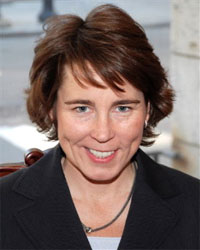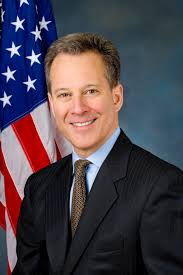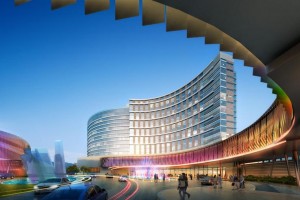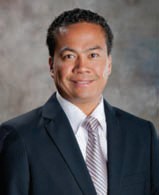Home team DraftKings (headquartered in Boston) got a vote of confidence from Massachusetts Gov. Charlie Baker (R), who opined that daily fantasy sports is a game of skill, not of chance. Last  weekend, Baker tried a little DraftKings wagering himself and concluded, “I’m convinced it’s legal in Massachusetts, I don’t have a problem with that … It’s a new enterprise, it’s a new business, it’s a new way of engaging people in these games of skill.” Disparaging his own skill at picking winning players, Baker said, “I was so intimidated by it that I don’t think we’ll ever have to worry about me spending a lot of time on it.”
weekend, Baker tried a little DraftKings wagering himself and concluded, “I’m convinced it’s legal in Massachusetts, I don’t have a problem with that … It’s a new enterprise, it’s a new business, it’s a new way of engaging people in these games of skill.” Disparaging his own skill at picking winning players, Baker said, “I was so intimidated by it that I don’t think we’ll ever have to worry about me spending a lot of time on it.”
He’s the second high-profile Bay State ally in DraftKings’ corner, state Attorney General Maura Healey being mainly concerned with consumer protections rather than legality. Meanwhile, the Massachusetts Gaming Commission has decided that getting involved with DFS lies outside its mandate, although Baker hinted he might extend that remit to include DFS rather than leave it unregulated.
There’s an iota or two of difference between Baker and Healey but the discrepancy is more cosmetic than substantive. The AG has called  DFS “gambling” but added, “Just because it’s gambling doesn’t make it illegal.” Her spokeswoman clarified Healey’s remarks by adding, “The attorney general has said that she does not believe we should use our criminal statutes, which never envisioned daily fantasy sports, to shut this entire industry down.” (That’s part of the problem with DFS: It seemingly came out of nowhere and everyone’s struggling to get their arms around the phenomenon.)
DFS “gambling” but added, “Just because it’s gambling doesn’t make it illegal.” Her spokeswoman clarified Healey’s remarks by adding, “The attorney general has said that she does not believe we should use our criminal statutes, which never envisioned daily fantasy sports, to shut this entire industry down.” (That’s part of the problem with DFS: It seemingly came out of nowhere and everyone’s struggling to get their arms around the phenomenon.)
Meanwhile, FanDuel and DraftKings — in a slightly comic development — are attempting to stage a protest rally in  Manhattan. (It’s not exactly a serious civil-rights issue.) More seriously, DraftKings thinks it has found a 2007 New Jersey case that gives it the legal precedent to overturn New York Attorney General Eric Schneiderman‘s (left) ban on DFS. In the Jersey case, a federal judge ruled that, because DFS prizes were guaranteed, paying an entry fee did not constitute making a wager. DraftKings attorney Randy Mastro argues that Empire State and Garden State laws are congruent in this respect. Schneiderman has given DraftKings and FanDuel through Sunday to close up shop, so Mastro’s first order of business is probably to obtain a temporary restraining order and let the games continue.
Manhattan. (It’s not exactly a serious civil-rights issue.) More seriously, DraftKings thinks it has found a 2007 New Jersey case that gives it the legal precedent to overturn New York Attorney General Eric Schneiderman‘s (left) ban on DFS. In the Jersey case, a federal judge ruled that, because DFS prizes were guaranteed, paying an entry fee did not constitute making a wager. DraftKings attorney Randy Mastro argues that Empire State and Garden State laws are congruent in this respect. Schneiderman has given DraftKings and FanDuel through Sunday to close up shop, so Mastro’s first order of business is probably to obtain a temporary restraining order and let the games continue.
* “This year’s Thanksgiving will have a much different meaning for our tribe,” said Mashpee Wampanoag Tribal Council Chairman Cedric Cromwell. How so? The federal government has officially transferred over 320 acres of land into trust for the tribe. This  includes acreage in Mashpee that already serves several purposes, including that of tribal cemetery. More important, the Mashpee Wampanoag gain access to 151 acres in Taunton earmarked for Project First Light Casino & Resort. The path finally seems clear for the tribe to submit the project to the Massachusetts Gaming Commission for study. Rival casino developer Neil Bluhm continues to warn of legal challenges to Project First Light but the Mashpee can afford to call his bluff: According to the Cape Cod Times, “no legal challenge has been filed to challenge the land decision.”
includes acreage in Mashpee that already serves several purposes, including that of tribal cemetery. More important, the Mashpee Wampanoag gain access to 151 acres in Taunton earmarked for Project First Light Casino & Resort. The path finally seems clear for the tribe to submit the project to the Massachusetts Gaming Commission for study. Rival casino developer Neil Bluhm continues to warn of legal challenges to Project First Light but the Mashpee can afford to call his bluff: According to the Cape Cod Times, “no legal challenge has been filed to challenge the land decision.”
* You’d think a company as big as MGM Resorts International could do as it pleased with regard to its Springfield project. Nope. MGM’s proposed downsizing of the $800 million megaresort has to  jump through a series of hoops, gaining the approvals of the city’s economic-development and planning departments, the city council and Mayor Domenic Sarno. And the Massachusetts Gaming Commission has to ultimately decide if the changes are OK or if they were sold a pig in a poke. It’s not clear what will happen if any of these five bodies says, “No” to MGM. It frankly seems inconceivable that MGM could be forced to go back to its original design for MGM Springfield, especially as it has presented Plan B as a fait accompli (which is an effective way to keep opponents playing defense, trying to salvage as much of the project as they can).
jump through a series of hoops, gaining the approvals of the city’s economic-development and planning departments, the city council and Mayor Domenic Sarno. And the Massachusetts Gaming Commission has to ultimately decide if the changes are OK or if they were sold a pig in a poke. It’s not clear what will happen if any of these five bodies says, “No” to MGM. It frankly seems inconceivable that MGM could be forced to go back to its original design for MGM Springfield, especially as it has presented Plan B as a fait accompli (which is an effective way to keep opponents playing defense, trying to salvage as much of the project as they can).
MGM, to its credit, is going to brave the potential wrath of Springfield at a Nov. 18 meeting, at which it will present its project  changes to Sarno and other city fathers. “We appreciate the opportunity that Mayor Sarno has provided us by setting the stage for a public update of MGM Springfield,” said President Michael Mathis, trying to accentuate the positive. The one drawback to the forum is that the public is barred from asking Mathis (or anyone) questions. If MGM hopes to gain acceptance for its downsized resort, it should be willing to open the floor to the citizenry, and the city council should give them that chance.
changes to Sarno and other city fathers. “We appreciate the opportunity that Mayor Sarno has provided us by setting the stage for a public update of MGM Springfield,” said President Michael Mathis, trying to accentuate the positive. The one drawback to the forum is that the public is barred from asking Mathis (or anyone) questions. If MGM hopes to gain acceptance for its downsized resort, it should be willing to open the floor to the citizenry, and the city council should give them that chance.

